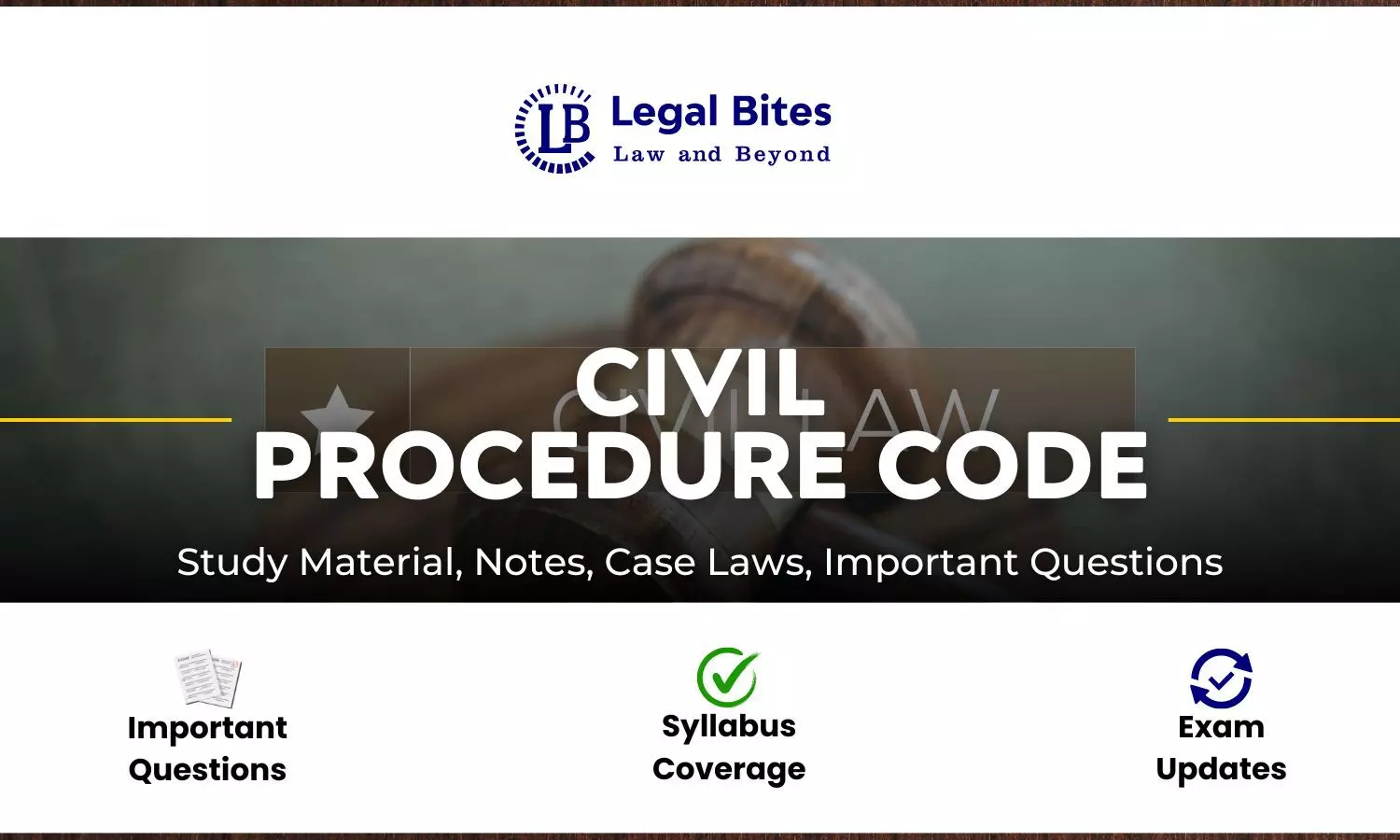Code of Civil Procedure, 1908 - Notes, Case Laws And Study Material
Master the Code of Civil Procedure, 1908 with Legal Bites: Notes, Case Laws, and Study Material.

The Code of Civil Procedure, 1908 (CPC) is an adjective law. It neither creates nor takes away any right. It is intended to regulate the procedure to be followed by civil courts. The Code of Civil Procedure came into effect on 1 January 1909. The objective of the Code is to consolidate and amend the laws related to the procedure of the Courts of Civil Judicature.
This course is divided into eight modules to provide readers with a comprehensive understanding of the Code of Civil Procedure. The study material's systematic approach covers the law's vast scope. Our well-researched and in-depth articles and the 10-part series of important questions and answers provided towards the end of the course have been curated to help readers master the intricacies of this essential law.
Read and learn about the Code of Civil Procedure only on Legal Bites.
Important articles and study material on Code of Civil Procedure, 1908 – Click on the links to Read
Module I: Introduction
- Introduction to Civil Procedure Code
- Code of Civil Procedure MCQs for Law Aspirants: Solved High-Quality MCQs for Judiciary Prelims
- History of the code
- Important definitions under CPC
- Difference between Decree and Order
- Master CPC Mains: Legal Bites CPC Solved Mains Question for Judiciary, APO and University Exams
Important Books and Practice Tests (Must Have)
- Civil Procedure, Limitation and Commercial Courts by C.K. Takwani (Author)
- The Code of Civil Procedure, 1908 Bare Act with Comments
- Master CPC Mains: Legal Bites' CPC Solved Questions Series for Judiciary, APO & University Exams
- 1000+ Detailed Questions MCQ Test Series for Competitions (Redirect to Law Aspirants)
Module II: General Principles
- Jurisdiction under the Code of Civil Procedure
- Hierarchy Of Civil Courts In India
- Bar on suits- Suits of civil nature
- Doctrine of Res sub judice
- Doctrine of Res judicata
- Res Sub Judice and Res Judicata
- Foreign Judgment
- Place of Suits
- Transfer of Suits: Application, Grounds and Scope
- Notice: Introduction, Mode and Essentials
- Caveat: Introduction, Meaning and Scope
- Inherent Power of Court (Meaning, Scope, Exercise, Regulations)
Module III: Civil Pleadings
- Definition and Fundamental Rules of Pleadings
- Plaint, Return and Rejection of a Plaint
- General Rules of Plaint
- General Rules of Denial
- Limitation for Filing Written Statement under CPC
- Doctrine of Non-Traversal
- Joinder, Re-joinder and Misjoinder
- Misjoinder of Causes of Action & Multifariousness
Module IV
- Summons – Issue & Service of Summons
- Appearance of Parties and Examination of Parties
- Appearance and Non-Appearance of Parties before a Court
- Abatement & Substitution
Module V
- Commencement of a Trial under the Code of Civil Procedure, 1908
- Admission and Affidavit
- Adjournment
- Death, Marriage and Insolvency of Parties
- Withdrawal and Compromise of Suits
Module VI: Judgement
- Judgment and Decree
- Decree, Judgment and Order
- Comprehending the Concept of Foreign Judgment
- Appeals Under Civil Law
- Appeal and Appeal from Orders
- Appeals | Part VII of Civil Procedure Code, 1908
- Second Appeal
- Meaning and Procedure of Review under the Code of Civil Procedure, 1908
- Revision
- Application to Miscellaneous Proceedings
Module VII
- Suits by or against Governments
- Suits by aliens and by or against foreign rulers, ambassadors
- Suits relating to public matters
- Suits by or against firms
- Suit by Indigent Person
- Suits by or against Minors
- Suits by or Against Minors and Persons of Unsound Mind: Order 32
- Arrest Before Judgment and Attachment Before Judgment
- Temporary Injunctions: Meaning and Types
- Appointment of Receivers: Introduction and Legal Provisions
- Reference- Review and Revision
- Inherent Powers of the Court under CPC
Module VIII
- The General Principle of Execution of a Decree
- Power of Executing Court: Introduction, Explanation & Limitation
- Transfer of Decrees for Execution
- Modes of Execution of a Decree
Module IX
- Applicability of Res Judicata to Quasi-Judicial Authorities in India
- An Overview of the Limitation Act 1963
Module X (Other Important Topics)
Important Questions for Exams | Judiciary, University, APO etc.
- CPC Mains Questions Series: Important Questions Part – I of X
- CPC Mains Questions Series: Important Questions Part – II of X
- CPC Mains Questions Series: Important Questions Part – III of X
- CPC Mains Questions Series: Important Questions Part – IV of X
- CPC Mains Questions Series: Important Questions Part – V of X
- CPC Mains Questions Series: Important Questions Part – VI of X
- CPC Mains Questions Series: Important Questions Part – VII of X
- CPC Mains Questions Series: Important Questions Part – VIII of X
- CPC Mains Questions Series: Important Questions Part – IX of X
- CPC Mains Questions Series: Important Questions Part – X of X
Your valuable feedback in the form of comments or any desired inputs are encouraged and always welcome. Every contribution toward a goal is valuable, regardless of how small it may be.
